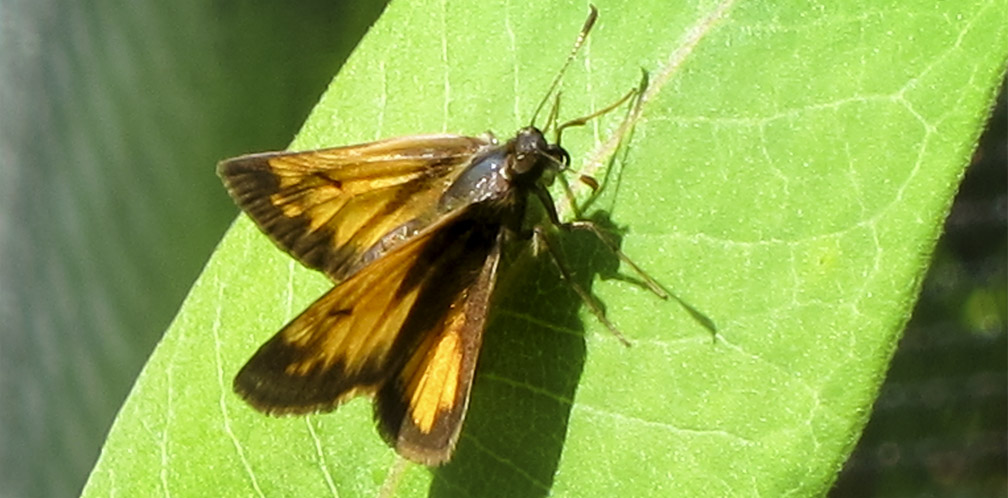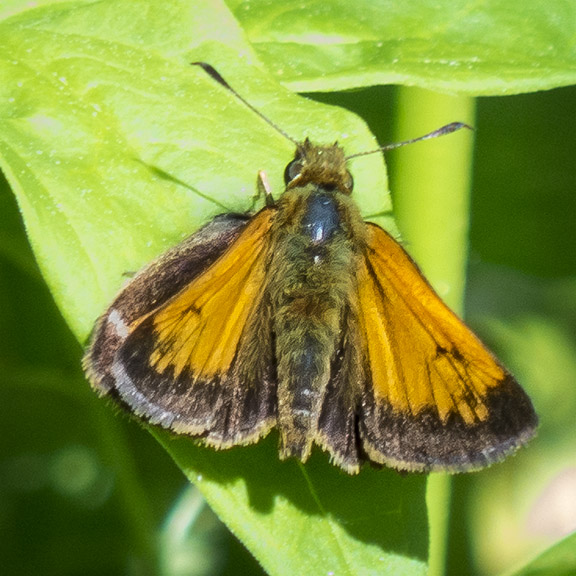Butterflies of the Adirondacks:
Hobomok Skipper (Poanes hobomok)

The Hobomok Skipper (Poanes hobomok) is a small orange and black butterfly that may be seen in the Adirondack Mountains of upstate New York in early summer. Skippers – while not true butterflies – are related to them and are generally considered a type of butterfly. Skippers appear to be intermediate between butterflies and moths. Like moths, they have relatively heavy bodies and dull colors. Like butterflies, they are active during the day. The name reflects the rapidly darting flight of this insect, which seems to skip about over the vegetation. [1]
Some sources refer to the Hobomok Skipper as the Northern Golden Skipper. The name Hobomok is said to be a reference to Hobomok, the chief of the Wampanoag Indians, a tribe which assisted the English who landed at Plymouth in 1621. [2]
The wings of the Hobomok Skipper are rounded. [3] From above, the male Hobomok Skipper is yellow-orange with irregular black borders. [4] The female is tawny orange. From below, the fore wing is more yellow than from above in both the male and the female. The tips of the wings and the outer margins are dark and may be bordered with violet.[5] The female has two color forms; the brown female (Pocahontas form) is mostly dark above, with a white spot in the forewing cell. [6] [7] The wing span of the Hobomok is about 1.2 inches. [8]
Male Hobomoks perch on leaves and aggressively pursue intruders. [9] Female Hobomok Skippers lay their eggs singly on or near host grass leaves. Caterpillar hosts include various grasses. [10] Adults feed on nectar from flowers such as common milkweed, henbit, and blackberry. [11]

From the ecological standpoint, the Hobomok Skipper is a generalist. [12] It is said to be very common and widespread and has been described as an edge species. [13] It is usually found in meadows, near woodlands and small clearings and trails, and around forest edges. [14] [15] [16] Its range extends from Nova Scotia west across southern Canada to Saskatchewan, south to New Jersey, the mountains of Georgia, Arkansas, and Kansas. [17]
The Hobomok Skipper usually flies from mid-May to mid-July over most of its range and until late July in the north. This skipper is most commonly seen in our area in June or early July. Hobomok Skippers were present in the Paul Smiths VIC Native Species Butterfly House in June 2012.[18] In 2013, this species was seen in the Butterfly House in mid- and late June and early July. In 2014, there were Hobomok Skippers in the Butterfly House in late-June. [19]
References
- Susan Grimm Hanley. Interpretive Naturalist, Paul Smith's College Native Species Butterfly House. Species Logbooks.
- Butterflies and Moths of North American. Species Profiles. Sighting records: 6/9/2012; 6/14/2012, 6/18/2013, 6/19/13, 6/20/13; 7/6/2013; 6/22/2014.
- Government of Canada. Canadian Biodiversity Information Facility. SpeciesBank.
- Massachusetts Butterfly Club. Massachusetts Butterfly Species List.
- ENature. Field Guides.
- Iowa State University. Department of Entomology. BugGuide.
- Dick Walton. Skippers of the Northeast. Grass Skippers: Summer Species. Hobomok Skipper, Zabulon Skipper.
- National Audubon Society. Field Guide to Butterflies (New York: Alfred A. Knopf, 1981), pp. 817-818.
- Jim P. Brock and Kenn Kaufman. Kaufman Field Guide to Butterflies of North America (Houghton Mifflin, 2003), pp. 330-331.
- Paul A. Opler. A Field Guide to Eastern Butterflies (The Peterson Field Guide Series, Houghton Mifflin Company, 1992,1998), pp. 114-115, 385.
- James A. Scott. The Butterflies of North America. A Natural History and Field Guide (Stanford University Press, 1986), p. 453.
- Donald and Lillian Stokes. Stokes Butterfly Book. The Complete Guide to Butterfly Gardening, Identification, and Behavior (Little, Brown and Company, 1991), pp. 92-95.
- Jeffrey Glassberg. Butterflies through Binoculars. The East. A Field Guide to the Butterflies of Eastern North America (Oxford University Press, 1999), pp. 185-186, Plate 64.
- Paul A. Opler and George O. Krizek. Butterflies East of the Great Plains: An Illustrated Natural History (The Johns Hopkins University Press, 1984), p. 244, Plate 49.
- Rick Cech and Guy Tudor. Butterflies of the East Coast. An Observer's Guide (Princeton University Press, 2005), p. 288.
